Nine Negro Spirituals, 1850-61, from Lower South Carolina
by Mrs. Mary Dickson Arrowood and Thomas Hoffman Hamilton
The Journal of American Folklore, Vol. 41, No. 162 (Oct. - Dec., 1928), pp. 579-584
NINE NEGRO SPIRITUALS, 1850 -61, FROM LOWER SOUTH CAROLINA
[Sung by Mrs. Mary Dickson Arrowood; the notes are by Mrs. Arrowood, the transcriptions by T. F. Hamilton.]
In the class of '45 was graduated from Yale University, like his father before him, Andrew Flinn Dickson of Charleston, South Carolina, where his father, John Dickson, M. D., was Professor in the Medical College, After graduation A. F. Dickson was for a time assistant to Dr. George Howe, renowned as founder of the School for the Blind, and intended to make that his life work, but when Dr. Howe decided to unite the school for the deaf with it, he withdrew, and completing his theological course, first travelled as missionary for the American Sunday School Union, and then became was over a small number of whites and a very large membership of negroes.
While these latter were enrolled and attended service with their masters, where were galleries reserved for them, their real services were separate, held at night, usually, where they had their own leaders for song and prayer and used the spirituals now so well known, some of which are here transcribed, as I believe, for the first time. During this pastorate Mr. Dickson published through the Philadelphia committee two volumes of "Plantation Sermons" of the kind he was accustomed to preach to his colored members. These were intended for the use of the white mistresses whose practice it was to gather their servants together on Sunday afternoons for instruction; but they were also largely used for prayer-meetings, etc., and after the war were republished by the committee under the title "Old Words Newly Spoken."
About 1858 Mr. Dickson removed eighty miles inland with his family to Orangeburg, where he served also the neighboring church of Barnwell. In both these he had a large colored membership. There was in Orangeburg next door to us a female college, whose students delighted, under my father's care, to attend the night service and hear the negroes sing. Here the white listeners were allowed to install themselves in the three back benches, and here with a college girl on each side of me, at the mature age of six, I revelled in joining in the music and singing as much and as loud as I pleased. What was organ, what was that trained choir upstairs compared to stalwart Joe Hook, the leader here, as he rolled out the opening words, and a hundred voices leaped to take it up and carry it on. No instrument, no keynote to sound, yet here were all parts, even more, than are in the books of written music, yet never a discord, though at each stanza the soprano soared higher, the bass thundered deeper, and as the refrain ended, another voice in the throng took up the strain, renewed it, and cast it back into the sea of melody. After the song service an earnest, live, practical sermon, never long, the personal appeal, then the leader stands forth to urge to repentance, to a better life, and as the song "Come Home" begins, the consciously black sheep surge forward, casting themselves down before the platform, while one of their leaders, amid the groans, sobs, and cries that pervade the room, utters a superb, perfervid prayer. Sixty years have not effaced that impression; nor of that hour in '65 when my father, broken and worn with four years' war service, turned sadly away from his last conference with Joe Hook, and the latter with tears on his cheeks was gone after telling his still loved pastor how "his people wanted their own churches now."
So that work was ended, but when in 1876 the Southern Presbyterian church out of its poverty fought its way to the beginnings of a colored Theological Seminary at Tuscaloosa, Alabama, he was its first Faculty, writing for papers North and South for it, teaching, undertaking the writing of suitable textbooks: all interrupted by his death in January, 1879, when his body was borne to its final rest by six of his students. In explanation of the songs, the one entitled Bredren, don' git weary was sung by the boatmen as they rowed, or for any work done in concert, and is from the sea-islands. Roll, Jordan, and De Ship Is in de Harbor are from the same section. The rest are from Orangeburga nd Barnwelld istricts, still in the section of large plantations and slaveholders.
WRESTLIN' JACOB- As sung in the districts around Orangeburg and Barnwell, S. C., 1858 -1861.
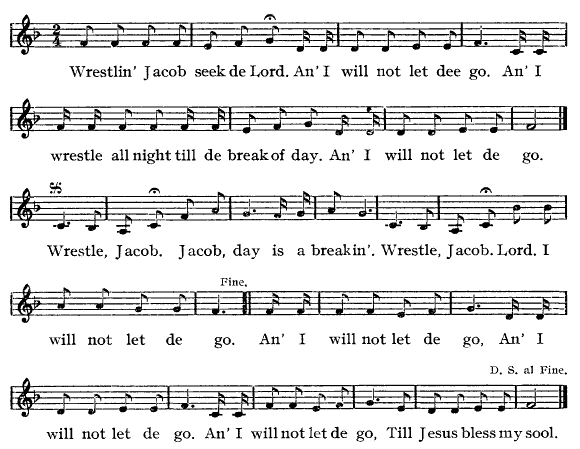
WE WILL WALK DOSE GOLDEN STREETS- As sung in the districts around Orangeburg and Barnwell, S. C., 1858-1861.
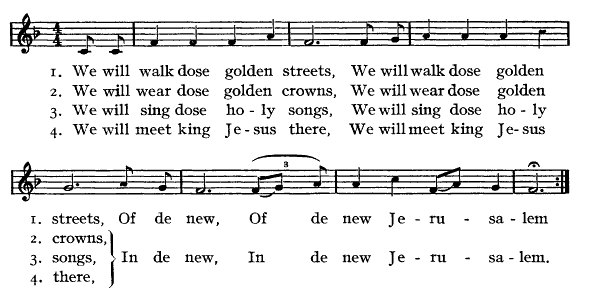
1. We will walk dose golden streets, We will walk dose golden
Of de new, Of de new Je - ru - sa - lem
2. We will wear dose golden crowns, We will wear dose golden crowns,
In de new, In de new Jerusalem.
3. We will sing dose holy songs, We will sing dose holy songs,
In de new, In de new Je - ru - sa lem.
4. We will meet king Jesus there, We will meet king Jesus there,
In de new, In de new Jerusalem.
COME HOME- As sung in the districts around Orangeburg and Barnwell, S. C., 1858-1861.
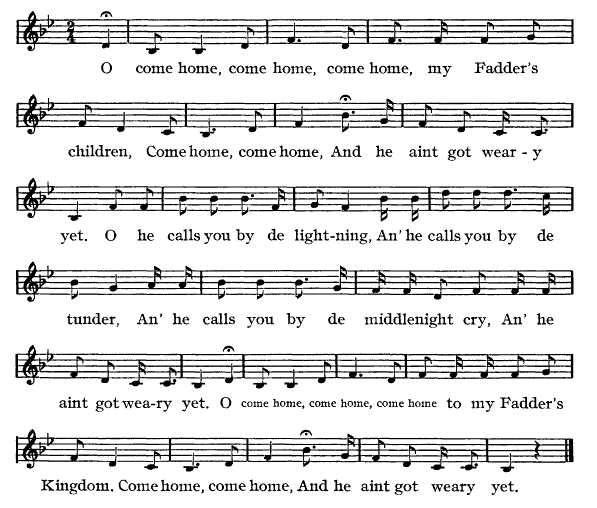
O come home, come home,
Come home, my Fadder's children,
Come home, come home,
And he aint got weary yet.
0 he calls you by de light-ning,
An' he calls you by de tunder,
An' he calls you by de middlenight cry,
An' he aint got wea-ry yet.
O come home, come home,
Come home to my Fadder's Kingdom.
Come home, come home,
And he aint got weary yet.
STAN' YO' STORM As sung in the districts around Orangeburg and Barnwell, S. C., 1858 -1861.
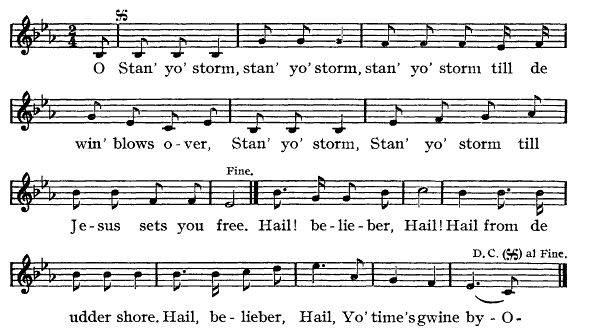
O, Stan' yo' storm, stan' yo' storm, stan' yo' storm till de win' blows over,
Stan' yo' storm, Stan' yo' storm till Jesus sets you free.
CHORUS: Hail! belieber, Hail!
Hail from de udder shore
Hail, be - lieber, Hail,
Yo' time's gwine by- O.
BREDDREN, DON' GIT WEARY- As sung on James Island, S. C., about 1850-1860
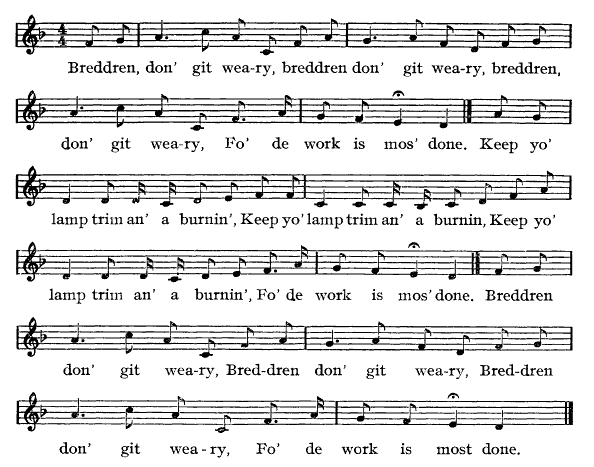
Breddren, don' git wea-ry,
Breddren don' git wea-ry,
Breddren, don' git wea-ry,
Fo' de work is mos' done.
Keep yo' lamp trim an' a burnin',
Keep yo' lamp trim an' a burnin,
Keep yo' lamp trim an' a burnin',
Fo' de work is mos' done.
Breddren don' git wea-ry,
Bred-dren don' git wea-ry,
Bred-dren don' git wea - ry,
Fo' de work is most done.
DERE'S A GOLDEN CROWN- As sung in the districts around Orangeburg and Barnwell, S. C., 1858-1861.
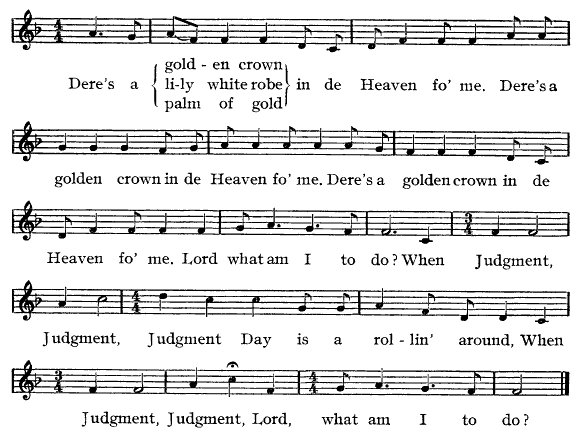
Dere's a golden crown in de Heaven fo' me.
Dere's a golden crown in de Heaven fo' me.
Lord what am I to do?
When Judgment, Judgment, Judgment Day is a rollin' around,
When Judgment, Judgment,
Lord, what am I to do?
2. Dere's a lily white robe in de Heaven fo' me &etc.
3. Dere's a palm of gold in de Heaven fo' me &etc.
ROLL, JORDAN- As sung on James Island, S. C., about 1850 -1860.
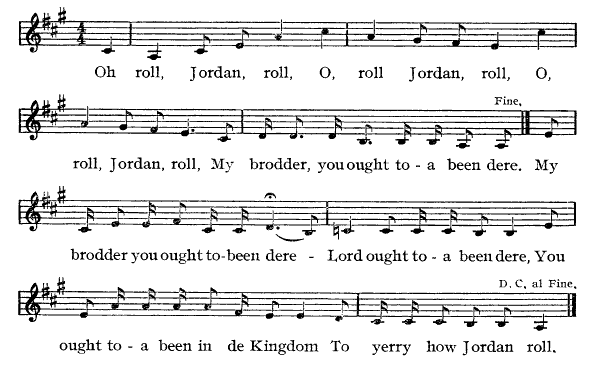
Oh roll, Jordan, roll,
O, roll J ordan, roll,
O, roll, Jordan, roll,
My brodder, you ought to a- been dere.
My brodder you ought to been dere
Lord, ought to a- been dere,
You ought to a- been in de Kingdom
To yerry how Jordan roll.
DE SHIP IS IN DE HARBOR- As sung on James Island, S. C., about 1850--1860.
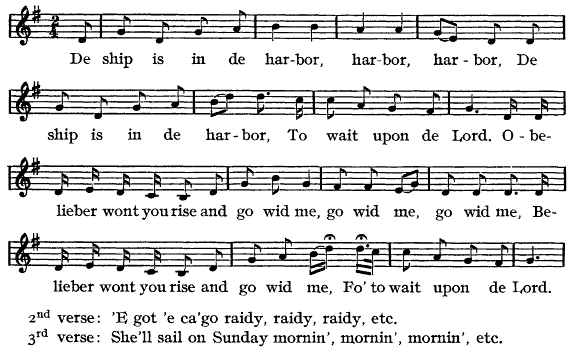
De ship is in de har-bor, har-bor, har - bor,
De ship is in de har - bor,
To wait upon de Lord.
O belieber wont you rise and go wid me, go wid me, go wid me,
Belieber wont you rise and go wid me,
Fo' to wait upon de Lord.
2nd verse: 'E got 'e ca'go raidy, raidy, raidy, etc.
3rd verse: She'll sail on Sunday mornin', mornin', mornin', etc.
A NEW BAND A RISIN'- As sung in the districts around Orangeburg and Barnwell, S. C., 1858 -1861.
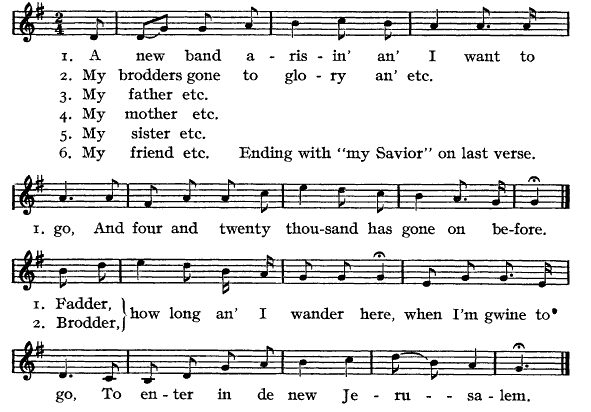
1. A new band a-risin' an' I want to go,
And four and twenty thou-sand has gone on before.
CHORUS: Fader, how long an' I wander here, when I'm gwine to' go,
To enter in de new Jerusalem.
2. My brodders gone to glo - ry an' etc.
3. My father etc.
4. My mother etc.
5. My sister etc.
6. My friend etc. Ending with "my Savior" on last verse.